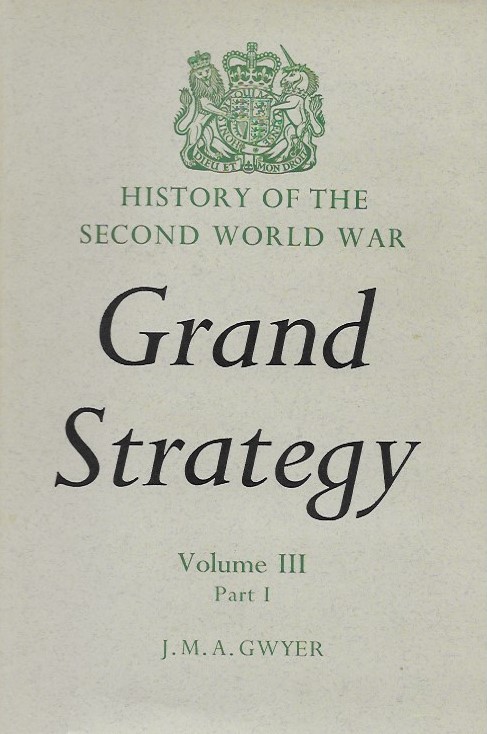

Books in series

#3
Grand Strategy, Vol. III, Part I
June 1941-August 1942
1964
THE PERIOD of the war covered in the present volume (June 1941-August 1942) is the last in which the enemy enjoyed the initiative; it is the first in which the means of victory, in men and materials, were assured to the Allies. The book begins with the German invasion of Russia and includes the entry into the war of Japan and the United States. By its close the Japanese expansion had been checked by the American victories in the Pacific; the Axis attack on Egypt had been held west of the Delta, and an Allied descent on French North Africa was impending; the German armies had failed to secure the oilfields of South Russia and were soon to meet disaster at Stalingrad. But in the meantime vast areas and important cities of the Soviet Union had been overrun; the Western Allies had paid heavy penalties for their unpreparedness in the Far East; in the Atlantic the submarine threat had not been mastered. The British bombing offensive was beginning to show results but was not yet seriously interfering with the German war effort.
The volume describes the creation of an Anglo-American organization for the central direction of the war and the emergence of an Allied strategy. It shows how this strategy was based on the decision to make the defeat of Germany its first object; how it was affected by the determination to maintain the resistance of Russia, whose early collapse was held to be more than possible; and how the British and Americans at length agreed after protracted controversy on the field of their major effort in 1942.

#4
Grand Strategy Vol IV
August 1942-September 1943
1972
This volume in the 'Grand Strategy' series of the United Kingdom Military Histories of the Second World war takes up the tale in the summer of 1942. At the end of July in that year Allied fortunes appeared to be at their lowest ebb. The Caucasus, the Nile Delta, the frontiers of India and even the northern shores of Australia were threatened by apparently invincible aggressors. Yet at the same moment the Western Allies were planning the counter-stroke against French North Africa which was within a year to transform the situation. By September 1943, when this volume ends, the Nazi Empire was on the defensive on all fronts, Mussolini had fallen, his successors had surrendered, Allied forces were seizing their first footholds on the mainland of Europe, and German cities were beginning to suffer the full weight of the Allied air attack.
The story of this transformation is now told for the first time from the official records of the British Government. It is a complex one. Throughout the whole period, the British and the Americans were engaged in continuing debate as to what their strategy should be, and the operations undertaken were usually compromises not fully satisfactory to either side. The spectacular triumphs in the Mediterranean from Alamein to Salerno depended on victory in the Battle of the Atlantic, and this was not finally achieved until April 1943. Naval operations required resources equally in demand for the air offensive on which so many hopes had been staked. And throughout this period the Western Allies were under continual and understandable pressure from the Soviet Union to do more to alleviate the burden she bore on the Eastern Front where the war, at this time, might have been irretrievably lost. Similar pressure from Nationalist China was to exercise a determining effect on British strategy in the Far East.
This volume is essential reading for all who wish to understand many of those great issues of the Second World War which are still a matter of so much controversy. The Second Front; the Combined Bomber Offensive; the Unconditional Surrender Declaration; the Surrender of Italy; the place of the Balkans in British strategy; the importance of 'Chindit' operations in Burma: these are only a few of the problems discussed in the light of evidence hitherto unavailable.
Authors

Michael Eliot Howard
Author · 14 books
Sir Michael Eliot Howard, OM, CH, CBE, MC, FBA, FRHistS was a British military historian, formerly Chichele Professor of the History of War, Emeritus Fellow of All Souls College, Regius Professor of Modern History at Oxford University, Robert A. Lovett Professor of Military and Naval History at Yale University, and founder of the Department of War Studies, King's College London. In 1958, he co-founded the International Institute for Strategic Studies together with British Labour MP Denis Healey and Oxford University academic Alastair Francis Buchan.